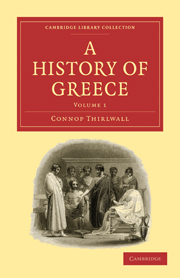Book contents
- Frontmatter
- ADVERTISEMENT
- Contents
- CHAPTER I GEOGRAPHICAL OUTLINES OF GREECE
- CHAP. II THE EARLIEST INHABITANTS OF GREECE
- CHAP. III FOREIGN SETTLERS IN GREECE
- CHAP. IV THE HELLENIC NATION
- CHAP. V THE HEROES AND THEIR AGE
- CHAP. VI THE GOVERNMENT, MANNERS, RELIGION, KNOWLEDGE, AND ARTS OF THE GREEKS IN THE HEROIC AGE
- CHAP. VII THE RETURN OF THE HERACLEIDS
- CHAP. VIII THE LEGISLATION OF LYCURGUS
- CHAP. IX THE MESSENIAN WARS AND AFFAIRS OF SPARTA DOWN TO THE SIXTH CENTURY B. C.
- CHAP. X NATIONAL INSTITUTIONS AND FORMS OF GOVERNMENT
- APPENDIX
CHAP. VII - THE RETURN OF THE HERACLEIDS
Published online by Cambridge University Press: 05 July 2011
- Frontmatter
- ADVERTISEMENT
- Contents
- CHAPTER I GEOGRAPHICAL OUTLINES OF GREECE
- CHAP. II THE EARLIEST INHABITANTS OF GREECE
- CHAP. III FOREIGN SETTLERS IN GREECE
- CHAP. IV THE HELLENIC NATION
- CHAP. V THE HEROES AND THEIR AGE
- CHAP. VI THE GOVERNMENT, MANNERS, RELIGION, KNOWLEDGE, AND ARTS OF THE GREEKS IN THE HEROIC AGE
- CHAP. VII THE RETURN OF THE HERACLEIDS
- CHAP. VIII THE LEGISLATION OF LYCURGUS
- CHAP. IX THE MESSENIAN WARS AND AFFAIRS OF SPARTA DOWN TO THE SIXTH CENTURY B. C.
- CHAP. X NATIONAL INSTITUTIONS AND FORMS OF GOVERNMENT
- APPENDIX
Summary
The Trojan war, as we find it described, was not, according to any conception that may be formed of the magnitude of the expedition and the conquest, an event that necessarily produced any important effects on the condition of Greece. There is no apparent reason why, as soon as it was ended, all the surviving princes and chiefs might not have returned to their dominions, to enjoy the fruits of their victory in honourable repose, and have transmitted their sceptres in peace to their children. The Odyssey accordingly represents parts of Greece as continuing, after the war, under the rule of the heroes who fought at Troy; and we might infer from this description, that the great national struggle was followed by a period of general tranquillity. On the other hand, the poet signifies that, after the fall of Troy, the victors incurred the anger of the gods, who had before espoused their cause. The Odyssey is filled with one example of the calamities which the divine wrath brought upon the Greeks, in the person of Ulysses, king of Ithaca. Menelaus himself, though we find him in the poem reigning in great prosperity at Lacedæmon, was only permitted to reach home after a long course of wandering over distant seas and lands. Ajax, son of Oileus, perished in the waves. Agamemnon was murdered, on his return to Argos, by Ægisthus, who in his absence had seduced his wife Clytæmnestra, and who usurped the throne of the murdered king, which was not recovered before the end of several years by Orestes, the rightful heir.
- Type
- Chapter
- Information
- A History of Greece , pp. 249 - 290Publisher: Cambridge University PressPrint publication year: 2010First published in: 1835

